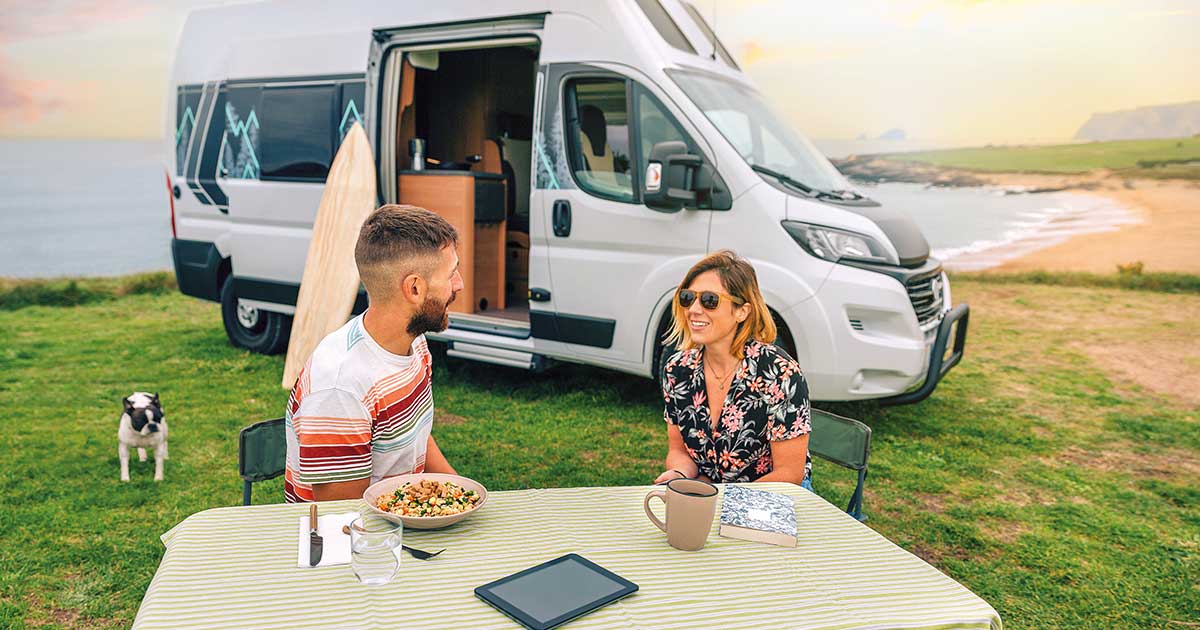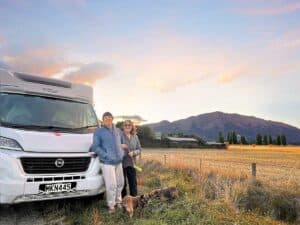While travelling together is a long-awaited dream come true for many, whether taking a short weekend trip or making the decision for full-time life on the road, being together 24/7 can test the most tolerant relationships. Life and relationship coach Bridgette Jackson shares some travel tips and advice.
For many couples, setting out on an adventure across Aotearoa is a dream come true. Whether you’re going for two weeks or 20, it brings a departure from the ordinary. It’s a blend of rewarding moments, no doubt, alongside unexpected hurdles. The opportunity will also present itself for couples to rediscover each other while navigating the road.
The idea of constant togetherness away from day-to-day routines may have enormous appeal, however, the reality of travelling 24/7 in a confined space brings unique challenges to even the strongest relationships.
Most couples look to the physical aspects around what’s needed to prepare for travel, but not every couple considers the emotional side; instead, there’s the tendency to think ‘she’ll be right’.
After weeks of preparation and planning, it’s not unusual for a couple’s first hurdle to actually be the realisation that they are in each other’s company around the clock. Even with the benefit of having been through COVID lockdowns, the adjustment to a smaller space and the realisation (or guilt) that friends and family may not be in the same position as you can feel overwhelming for a few days.
Navigating the challenges
While spending quality time together is essential for any relationship, constant togetherness can lead to potential silent animosity and potential conflict, escalating to resentment and unspoken contempt.
It’s crucial to establish open communication from the start. Be open and honest with yourself and each other; at times, there will be challenges to the relationship, communication, and potential irritation. It’s important to establish some personal space, downtime, and independent activities. Discussing boundaries and acknowledging each other’s need for alone time will prevent frustration, foster a healthier travel experience, and build on your strong relationship foundation.
Travelling together in a small space
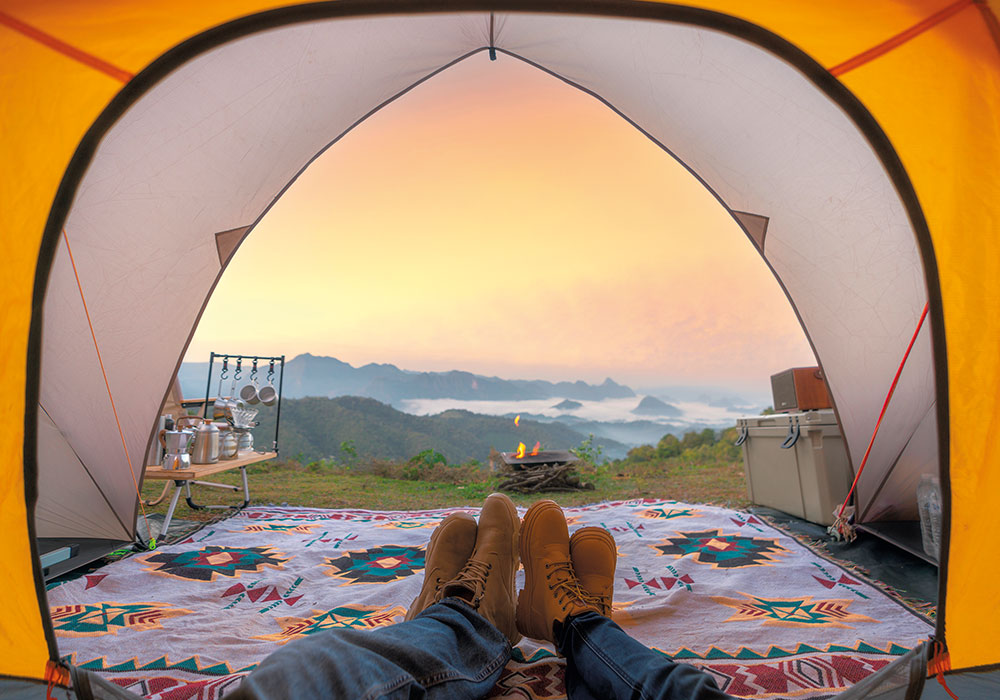
Motorhomes and caravans are cosy, compact, and easy to travel in. With that comes living in close quarters that can magnify irritation and disagreements.
The key is to embrace intimacy while respecting each other’s personal space. Utilise storage efficiently, keep the living space organised and clean and designate a space for everything, including personal items. This also means respecting what each other wants to travel with and being accommodating. Discuss this beforehand and agree to a set amount of space that will be for what each other wants to travel with and be prepared to compromise. This will hopefully avoid the need to tow a trailer behind you. Creating a comfortable and clutter-free environment will significantly contribute to a more enjoyable adventure.
No solo time
In a constricted space, the concept of personal time becomes a luxury. So, it’s essential to find creative ways to carve out moments for each to do their own thing. Consider taking turns exploring nearby areas alone, and scheduling ‘me time’ within the confines of the motorhome.
This can be as simple as reading a book, listening to music, or practising a hobby. Prioritise these solo periods to recharge individually.
Balancing the travel budget
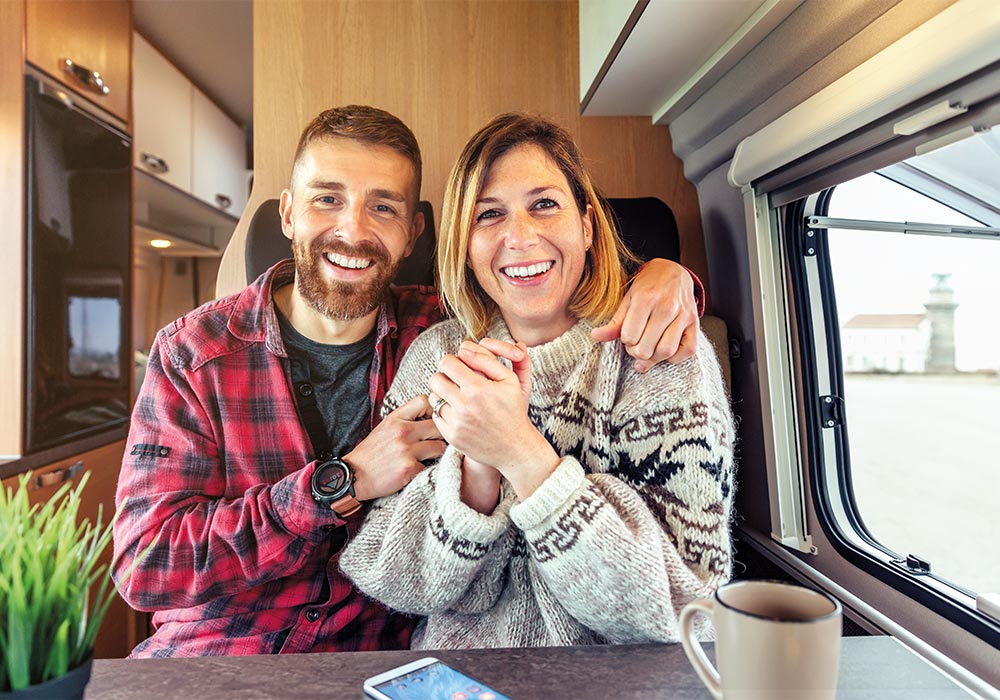
Money, so the saying goes, is not an infinite resource. Therefore, stressing about the budget, how much or how little is left, and who spent what should be the last thing on your mind.
Many would be surprised to know that some couples travel with no budget in place or have a joint discussion about their finances before they depart. Coming home to a large or maxed-out credit card bill is no fun. Worse still is having finances run out along the way and having to spend a day or two working out where it has gone and where to transfer additional funds from. It’s nothing short of exhausting and will not only place a dark cloud over the trip but also more than likely strain the relationship.
To avoid this, I recommend having a plan and budget that couples have input into before they depart. The below tips can also help:
- Make the financial plan and conversation a priority. Create a plan that you both agree to and live within your means.
- Look at all the expenses that need to be accounted for, at home and while you are away. This plan can include:
- All costs associated with the motorhome or caravan. Include a contingency budget in case of any breakdowns. Budget petrol/diesel at the higher end and not at your local petrol station price. Instead, research the cost of refuelling at your furthest and most rural travel point. Apps such as Gaspy and Fuelio can help with this.
- Have a budget that also includes cost for groceries, entertainment, funds for your solo time spending money, and camping ground expenses. Include a contingency budget for any other expenses that may arise while you’re away.
- Agree on a day and time each week to review your budget together. You could do this at the end of breakfast over coffee or before dinner over a drink. You can do this manually with pen and paper or using an app to keep running totals, such as your banking app or Mint or Goodbudget.
- Be consistent and realistic. You may find that some things are more expensive than budgeted for or that you have had to dive into the contingency budget. The main thing is to agree on the best plan.
Just like your vehicle needs a regular check-up, your relationship requires maintenance and time spent on it too. It doesn’t matter how old or young you are, and there’s no better place to do that
than away from home. Reassessing your shared vision and goals ensures you’re both still aligned on what the future looks like together.
Relationship WOF
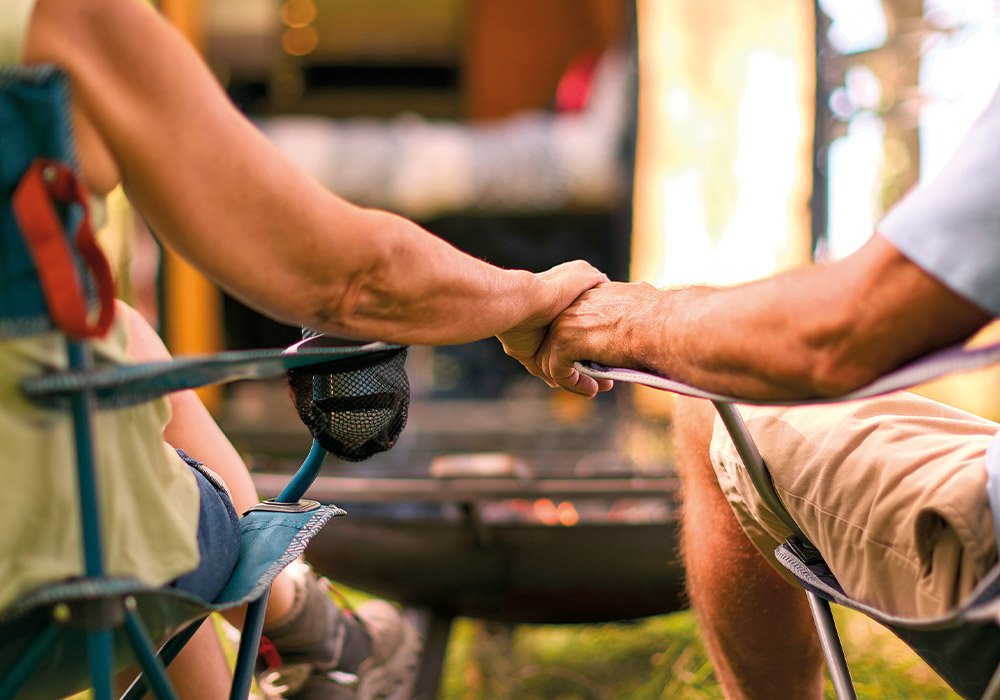
Yes, there’s such a thing as a relationship WOF. We have 60-plus questions we recommend couples ask each other before committing to a serious relationship to ensure they’re truly aligned for a future together. The questions may show where they’re not aligned. It’s then up to them to find a compromise, so obstacles can be worked through before five or even 20 years go by.
As a couple, revisiting your relationship goals and personal goals together is a good way to come back to a common viewpoint and become stronger together. This is called a ‘Relationship WOF’ and it can be fun. You can liken it to spending time as you do maintaining your motorhome or caravan, as every relationship needs time spent on it to keep it running smoothly.
You may find that being away together brings more clarity to your relationship and is a good time to discuss any concerns and express gratitude for each other. If you feel inclined, some questions you could ask each other are:
- What do you do to make me happy that you do not really like?
- How do you know I love you and appreciate you?
- What do you think we could do to make our relationship better?
- How often do you think we should be having sex?
- What do you love most about me?
- What’s our top priority as a couple? Does it need to change?
- What’s your favourite sexual memory of us so far?
- What are your non-negotiable needs in our relationship?
- Have you changed your hopes or wants for our life path together?
- Are we spending enough time on our relationship at home?
- If not, what can we do about it?
- What’s one of your favourite memories from our earlier years together, and why does it stand out to you?
- What’s one tradition (travel-related or not) or ritual we used to have that you’d like to revive?
- How has travelling together shaped our relationship over the years, and what valuable lessons have you learned from our adventures together?
- How can we keep our bodies moving and minds active?
Our breathtaking landscapes provide an unparalleled backdrop for your time together when travelling, but it’s vital to ensure that the beauty outside doesn’t overshadow the connection inside your space. Appreciate the journey together, savour the moments, and be present in each experience. Use this time to strengthen your bond, share laughter, and create lasting memories; after all, the real adventure is the journey you take together as a couple.
Remember these:
- Your partner is your intimate partner – this is not about sex. Your partner is the one who knows you personally and who you have a deep connection with.
- Communicate, communicate, communicate – to have an open, honest relationship with your partner, you must be able to communicate. When you have this, you will both be more attuned to each other.
- Make the ordinary less ordinary – it doesn’t matter if you’re having toast or a cold sandwich for dinner; it’s more about making the time together feel special.
- Even though you will be side by side, check in with each other daily. It’s surprising what five minutes of one-on-one with no distractions can feel like.
- Show appreciation of each other – sometimes we only see what wasn’t done and we forget that we need to look for what was done.
Embarking on a trip and adventure across Aotearoa is a remarkable opportunity. It’s the opportunity to deepen your connection and create lasting memories. While challenges may arise, adopting a proactive approach to communication, personal space, and relationship maintenance will transform your time into an enriching experience. Embrace the beauty of our country and each other, and remember that the road ahead is an adventure meant to be shared. Happy travels.
Bridgette Jackson is a CDC-certified divorce/separation coach with a post-graduate dispute resolution qualification. She’s also a trained divorce mediator (AIMNZ) relationship coach (Institute for Life Coach Training) and a member of the Institute of Executive Coaching and Leadership (accredited by the ICF – International Coaching Federation). Bridgette is also an enrolled barrister and solicitor of the High Court of New Zealand.

